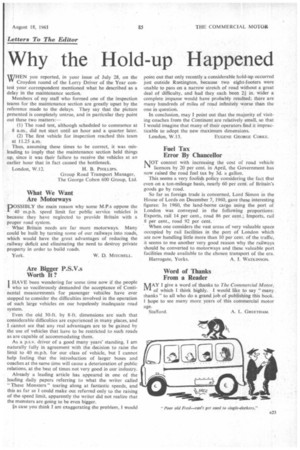Why the Hold-up Happened
Page 57

If you've noticed an error in this article please click here to report it so we can fix it.
WHEN you reported, in your issue of July 28, on the " Croydon round of the Lorry Driver of the Year contest your correspondent mentioned what he described as a delay in the maintenance section.
Members of my staff who formed one of the inspection teams for the maintenance section are greatly upset by the reference made to the delays. They say that the picture presented is completely untrue, and in particular they point out these two matters:—
(1) The road test, although scheduled to commence at 8 a.m., did not start until an hour and a quarter later.
(2) The first vehicle for inspection reached this team at 11.25 a.m.
Thus, assuming these times to be correct, it was misleading to imply that the maintenance section held things up, since it was their failure to receive the vehicles at an earlier hour that in fact caused the bottleneck.
London, W.12. H. B. PHILLIPS.
Group Road Transport Manager, The George Cohen 600 Group, Ltd.
What We Want Are Motorways
POSSIBLY the main reason why some M.P.s oppose the I 40 m.p.h. speed limit for public service vehicles is because they have neglected to provide Britain with a proper road system.
What Britain needs are far more motorways. Many could be built by turning some of our railways into roads, which would have the great advantages of reducing the railway deficit and eliminating the need to destroy private property in order to build roads.
York. W. D. MITCHELL.
Are Bigger P.S.V.s Worth It?
I HAVE been wondering for some time now if the people 1. who so vociferously demanded the acceptance of Continental measurements for passenger vehicles have ever stopped to consider the difficulties involved in the operation of such large vehicles on our hopelessly inadequate road system.
Even the old 30-ft. by 8-ft. dimensions arc such that considerable difficulties are experienced in many places, and I cannot see that any real advantages are to be gained by the use of vehicles that have to be restricted to such roads as are capable of accommodating them.
As a p.s.v. driver of a good many years' standing, I am naturally fully in agreement with the decision to raise the limit to 40 m.p.h. for our class of vehicle, but I cannot help feeling that the introduction of larger buses and coaches at the same time will cause a deterioration of public relations, at the best of times not very good in our industry.
Already a leading article has appeared in one of the leading daily papers referring to what the writer called "These Monsters" tearing along at fantastic speeds, and this as far as I.could make out referred only to the raising of the speed limit, apparently the writer did not realize that the monsters are going to be even bigger.
In case you think I am exaggerating the problem, I would point out that only recently a considerable hold-up occurred just outside Rustington, because two eight-footers were unable to pass on a narrow stretch of road without a great deal of difficulty, and had they each been 21 in. wider a complete impasse would have probably resulted; there are many hundreds of miles of road infinitely worse than the one in question.
In conclusion, may I point out that the majority of visiting coaches from the Continent are relatively small, so that I would imagine that many of their operators find it impracticable to adopt the new maximum dimensions.
London, W.13. EUGENE GEORGE CORKE.
Fuel Tax Error By Chancellor
NOT content with increasing the cost of road vehicle licences by 20 per cent. in April, the Government has now raised the road fuel tax by 3d. a gallon.
This seems a very foolish policy considering the fact that even on a ton-mileage basis, nearly 60 per cent. of Britain's goods go by road.
So far as foreign trade is concerned, Lord Simon in the House of Lords on December 7, 1960, gave these interesting figures: In 1960, the land-borne cargo using the port of London was conveyed in the following proportions: Exports, rail 14 per cent., road 86 per cent.; Imports, rail 8 per cent., road 92 per cent.
'When one considers the vast areas of very valuable space occupied by rail facilities in the port of London which are now handling little more than 10 per cent, of the traffic, it seems to me another very good reason why the railways should be converted to motorways and these valuable port facilities made available to the chosen transport of the era.
Harrogate, Yorks. A, I. WATK INSON.
Word of Thanks From a Reader
NAAY I give a word of thanks to The Commercial Motor, "A of which I think highly. I would like to say "many thanks" to all who do a grand job of publishing this book. I hope to see many more years of this commercial motor age.
Stafford. A. L. GREETITAM.




















































































































